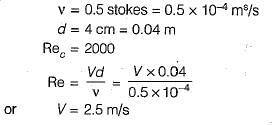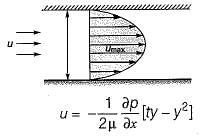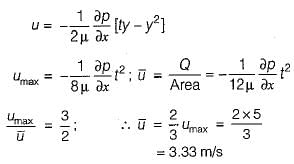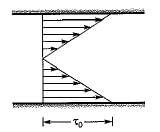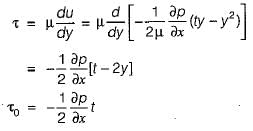Mechanical Engineering Exam > Mechanical Engineering Tests > Test: Viscous Flow - 1 - Mechanical Engineering MCQ
Test: Viscous Flow - 1 - Mechanical Engineering MCQ
Test Description
10 Questions MCQ Test - Test: Viscous Flow - 1
Test: Viscous Flow - 1 for Mechanical Engineering 2024 is part of Mechanical Engineering preparation. The Test: Viscous Flow - 1 questions and answers have been prepared
according to the Mechanical Engineering exam syllabus.The Test: Viscous Flow - 1 MCQs are made for Mechanical Engineering 2024 Exam.
Find important definitions, questions, notes, meanings, examples, exercises, MCQs and online tests for Test: Viscous Flow - 1 below.
Solutions of Test: Viscous Flow - 1 questions in English are available as part of our course for Mechanical Engineering & Test: Viscous Flow - 1 solutions in
Hindi for Mechanical Engineering course.
Download more important topics, notes, lectures and mock test series for Mechanical Engineering Exam by signing up for free. Attempt Test: Viscous Flow - 1 | 10 questions in 30 minutes | Mock test for Mechanical Engineering preparation | Free important questions MCQ to study for Mechanical Engineering Exam | Download free PDF with solutions
Test: Viscous Flow - 1 - Question 2
An oil of kinematic viscosity 0.5 stokes flows through a pipe of 4 cm diameter. The flow is critical at a velocity of about
Detailed Solution for Test: Viscous Flow - 1 - Question 2
| 1 Crore+ students have signed up on EduRev. Have you? Download the App |
Test: Viscous Flow - 1 - Question 3
In flow through a pipe, the transition from laminar to turbulent flow does not depend on
Detailed Solution for Test: Viscous Flow - 1 - Question 3
Detailed Solution for Test: Viscous Flow - 1 - Question 6
Test: Viscous Flow - 1 - Question 7
For laminar flow between two fixed parallel plates, the flow velocity
Detailed Solution for Test: Viscous Flow - 1 - Question 7
Test: Viscous Flow - 1 - Question 8
The maximum velocity of a one-dimensional incompressible flow between two fixed parallel plates is 5 m/s. The mean velocity (in m/s) of the flow is
Detailed Solution for Test: Viscous Flow - 1 - Question 8
Test: Viscous Flow - 1 - Question 9
The shear stress between two fixed parallel plates with a laminar flow between them
Detailed Solution for Test: Viscous Flow - 1 - Question 9
Test: Viscous Flow - 1 - Question 10
Velocity for flow through a pipe, measured at the center is found to be 3 m/s. If the Reynolds number is around 1000, what is the average flow velocity in the pipe?
Detailed Solution for Test: Viscous Flow - 1 - Question 10
Information about Test: Viscous Flow - 1 Page
In this test you can find the Exam questions for Test: Viscous Flow - 1 solved & explained in the simplest way possible.
Besides giving Questions and answers for Test: Viscous Flow - 1, EduRev gives you an ample number of Online tests for practice
Download as PDF


